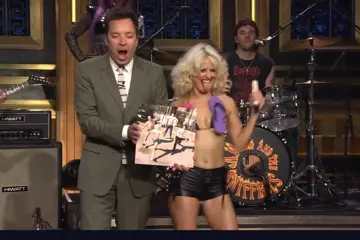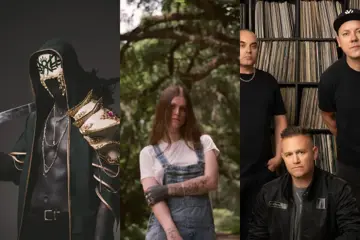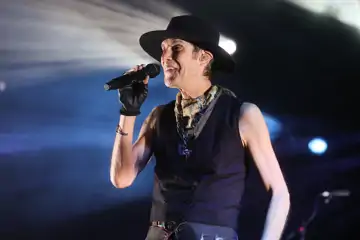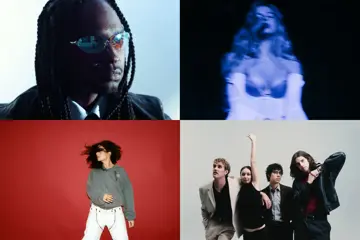When Sydney garage-rock three-piece Bloods came up with their simple, iconic handle, they had, according to guitarist/vocalist Marihuzka Cornelius – referred to, in the band, simply as MC – two simple ideas in mind: “A) We wanted a really tough name”; and “B) We wanted a name that was symbolic of our friendship, the fact that we’re all bonded together like siblings,” she says, referring to her bandmates Victoria ‘Sweetie’ Zamora and Dirk Jonker.
What they weren’t thinking of was the fact that, in North America – or, indeed, to any hip hop listener – Bloods was synonymous with gang culture, and violence. “If we ever tour America, we might have to change our name, to, like, The Bleeders, or something,” Cornelius laughs. “How else can we play in LA if we’re named Bloods? When we were starting, we weren’t thinking beyond our bedroom; so, even though we knew it had a connection to gangs, we didn’t think anything of it. But right from the beginning, we had lots of legit gang members liking our Facebook page. We actually had to let people know that we’re just a band, not a front. Still, we did recently get one funny Facebook message from this kid in America: ‘Don’t y’all know that Bloods is a gang? Dumb white people!’”
Well, not exactly white. The 32-year-old was born Marihuzka Larenas-Esquivel (“growing up with a weird name, you just try to make it easier on people: ‘call me MC!’”) in Panamá, to a Panamánian mother and a Chilean father. They migrated to Australia when Cornelius was three, settling in Riverwood in suburban Sydney. “Growing up in that kind of area, a pretty dodgy one, really shapes you: you have to learn to get along with a lot of different types of people, and have your wits about you,” she considers. Though her older sisters were drawn to fashion and sport, respectively, Cornelius was, from as young as she can remember, obsessed with rock’n’roll.
"Right from the beginning, we had lots of legit gang members liking our Facebook page."
“From when I was very little, I knew I had to be involved in music in any capacity, but, hopefully, specifically, playing and singing and touring,” Cornelius recounts. “I never wanted to be a huge pop-star, I always just wanted to play in a band. I grew up in the ’90s, so everything was really band-driven. The bands that were as big as One Direction is now were Nirvana, Hole, the Red Hot Chili Peppers. Grunge was pop music in the ’90s, so from the beginning I was drawn to that live guitar/bass/drums element, and to touring... Touring was a really romantic thing. The idea of travelling and not seeing your home for a long time, going off on an adventure together. When you’re touring, there’s this bubble around you; this sense that you and the people in your band are all that exists. It’s like a travelling circus. I loved the idea of that when I was younger, and I’m still into the romantic ideal: this gypsy lifestyle, where you’re all in it together.”
Inspired by heroes like Hole, Sleater-Kinney (“they’re like my favourite, favourite band”), and Veruca Salt – the latter of whom Bloods just finished supporting on an Australian tour – Cornelius first picked up a bass as 13-year-old in thrall to riot-grrrl. Roping in two friends at her Catholic all-girls school, she formed her first band, Pillbox. “We had really earnest lyrics, and it was very dramatic and, in hindsight, hilarious. I think there’s still a cassette of us jamming around somewhere. We played YouthRock, the competition that Silverchair competed in and won,” she remembers. “Since then, I’ve never really stopped playing music. Sometimes I think about it like: ‘I’m still doing the same thing I was doing when I was 13!’ Which sounds kind of pathetic when you say it out loud. But being in bands is something I think I’ll always do; it’s what I do with my life.”
Over the years, there’s been a lot of bands. Cornelius played in a raucous garage-rock outfit called The Hot Box. She did a secret stint in cover-band The Meek, the young girl singer fronting a crew of grizzled, 40-something punk dudes. She played in the Regurgitator side-project Ben Ely’s Radio 5. And she – along with her future Bloods brothers Jonker and Zamora – spent years as a member of epic-rock six-piece Lions At Your Door. It was the death of that band, in 2011, that inspired the beginning of Bloods. “Towards the end of [Lions At Your Door], it was no longer fun; it became a bit of a chore. We wanted to start something that was fun, that was just for us,” Cornelius offers. So, the three members all took up new instruments: Cornelius, a vocalist and bassist, picked up a guitar and punk’s eternal, mythical ‘three chords’; Zamora, a violinist, learnt the bass; and Jonker, a guitarist, sat down behind the drums. The band’s fuzzed-out garage-rock-cum-pop-punk sound “came from us all not knowing what we were doing”, the fact that they were all playing new instruments adding to the sense of fun.
Three years on, with innumerable live shows, an early run of Bandcamp singles, an EP (2013’s Golden Fang), and, now, a debut LP, Work It Out, all under their belt, has that fun persisted? Have Bloods lived up to their goal? “Absolutely!” Cornelius chirps. “I can honestly say that these shows we’ve just done with Veruca Salt has been some of the most fun I’ve ever had in my life. It actually feels like, three years later, it’s more fun. The more shit that gets thrown at us, the more people that hear of us, the bigger the shows get, the more fun it becomes. Because we never expected anything like this. When we started it, we just wanted to play, we didn’t really care what happened with it. Now that all this stuff has happened with it, we can’t believe our luck.”
That fun has persisted even as Bloods have grown more permanent, and Cornelius has started to feel more of a sense of careerist responsibility; the arrival of Work It Out coming months after the arrival of her daughter, Penny. “When I was pregnant, I remember reading an article with Corin Tucker of Sleater-Kinney, and she was asked about how she balances having kids with the Corin Tucker Band. And she said: ‘I just try to do the best job I can with both of them; I give 100% to the band and 100% to my kids’. And I thought: ‘that’s so simple, but that’s it’,” Cornelius says. “It’s funny people’s preconceptions of women; it felt like from the moment I was pregnant, people were asking things like: ‘what’s going to happen with the band?’ And I’d be like: ‘um, we’re recording an album next year!’ But everyone was so suspicious of this, they were sure I’d just become a mum and give up. It’s just so wrong that people think that. I didn’t initially plan on broadcasting the fact that I was pregnant, but I just got fucking sick of that attitude.”
Bloods’ latest single, Penelope, foregrounds that idea, detailing the anxiety of joy of bringing a child into the world that can be both “totally amazing” and “so shitty”. It’s a standout jam on Work It Out, an album that has a little more polish and far more swagger than Bloods’ early singles, yet stops short of anything approaching productional gloss. “You can get carried away with ambition for making an album,” Cornelius considers. “Like: ‘We’re going to record it, spend this much money on it, send it away to this amazing producer in America to mix it’. When I thought about all that stuff, I was like: ‘That’s just fucking nuts. We’re a punk band!’” So, they rolled tape – literally – with Owen Penglis of Straight Arrows, who recorded Bloods playing live, straight to tape. “He’s just a vibe guy, always: ‘if it feels good, don’t overthink it’,” Cornelius says. “Move on, and then you can capture that energy, that urgency you get when you see a band play live. People always talk about our live energy, so that’s what we needed to capture: something that was raw, that just sounded like us.”
Work It Out sounds like ‘them’ in more ways than one: the energy of Bloods on stage coming from their personal energy off it; the album capturing how they are as humans, and how they bond together. “We’re all quite bubbly and super-talkative,” Cornelius says. “And I find it really difficult to not be doing something all the time. We over-commit to everything, you look at our schedule and it’s just nuts. We all have a lot of energy all the time, not just on stage. And we’re really silly people. Most of the time, when we hang out, we’re teasing each other, finding things to make each other laugh, being silly. That’s something that I think comes through in our songs, and, hopefully, on this album.”















